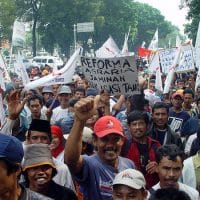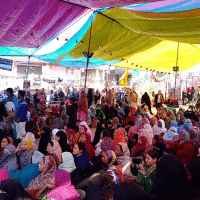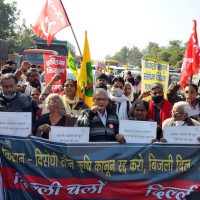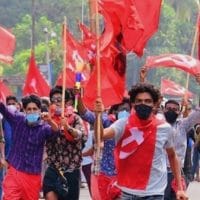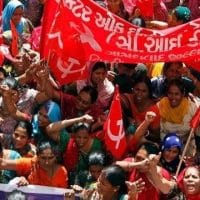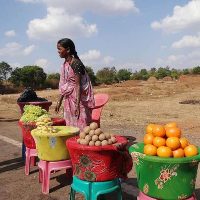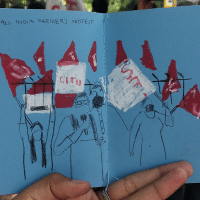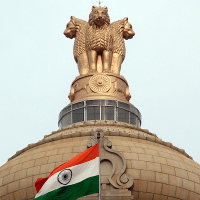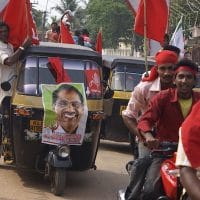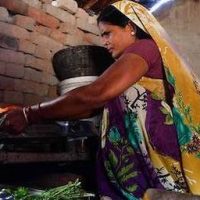-
The Global angle to the Farmer protests
The farmers’ movement for the repeal of the three farm laws which affect them closely but have been rammed through without consulting them, has now entered its second month.
-
A matter of survival of the peasantry
The kisans gathered around the Delhi border have unerringly put their fingers on the real issue confronting them, namely their very survival as peasants.
-
For the Ruthless Abolition of the Caste System
The Communist movement in India celebrated its centenary on October 17, 2020. The party was founded in Tashkent (USSR) in 1920. A decade later, most of the leaders of the Communist Party of India (CPI) were arrested by the British colonial state and imprisoned in Meerut.
-
Indian women revive non-violent civil disobedience movements against the extinguishment of citizenship rights
On 11 December 2019 one of the largest peaceful Civil Disobedience Movements in India after Indian Independence in defence of the Constitution and Constitutional rights, began under the leadership of Indian Muslim women in Delhi.
-
Nationwide farmers struggle intensifies, gets ready for the long haul
THE historic nationwide farmers struggle that began on November 26 entered the fourth week on December 17. It was intensified and broadened even further after the unprecedented support that was expressed by the people of India through the Bharat Bandh on December 8.
-
Communist-led coalition sweeps local body elections in the southern Indian State of Kerala
The alliance led by the Communist Party of India (Marxist) has won more seats in local government bodies than the opposition groups combined.
-
On some peremptory ‘critiques’ of India’s Maoist movement
Revolutions are very costly in terms of human lives and suffering, and so “we” are shocked that “you” radicals even consider them as options. And so “we” have to express “our” rejection and condemnation.
-
How the rich are cashing in on pandemic pain
Millions of day labourers in India lost their jobs overnight earlier this year when Narendra Modi’s central government hastily announced a national lockdown.
-
Over 200 million workers and farmers protest against poverty and unemployment triggered by COVID Lockdown
The general strike occurred in the context of the devastation brought about by the coronavirus pandemic in India. Added to this are the millions of people who have lost income and who now face increased poverty and hunger, in a country where even before the pandemic 50 percent of all children suffered malnourishment.
-
The pillage of resources: A glimpse into the lives and labor of marginalized women
Lives of women dependent on natural resources, such as land, forests, rivers, and mountains, are being tossed asunder by the appropriation and expropriation of these resources by corporations and the state.
-
We are grass. We grow on everything
Farmers and agricultural workers from northern India marched along various national highways toward India’s capital of New Delhi as part of the general strike on 26 November.
-
Capitalism and inheritance
IT is often believed that the ability to pass on property to one’s progeny is an essential element of capitalism, without which the capitalists’ incentives will dry up and the system will lose its dynamism.
-
The 1857 rebellion in Colonial India
The 1857 Rebellion against British rule in Colonial India hasn’t always received the attention it deserves, despite being one of the most important uprisings of the 19th century. Pranav Jani argues it’s high time we changed that.
-
India’s farewell to ASEAN as it boards RCEP train
It comes in the specific context of the signing of the Regional Comprehensive Economic Partnership [RCEP] on Sunday—the mega free trade agreement centred on the ASEAN plus China, Japan and South Korea.
-
India’s move toward a de facto unitary state
India is being pushed toward a de facto unitary state, with states being kept totally out of the loop in decision-making, as seen in the new agricultural laws, goods and services tax compensation, Jammu and Kashmir bifurcation and new National Education Policy.
-
How India’s Modi is changing laws to help imperialists dominate the country’s agriculture
The fact that the Center made unilateral and fundamental changes in agricultural marketing arrangements that fall within the State List of the Seventh Schedule of the Constitution was a blow against federalism.
-
One hundred years of Indian communism
The economic programme suggested for such a front included the right to strike, banning reductions of wages and dismissals of workers, an adequate minimum wage and 8-hour day, a 50 per cent reduction in rents and banning the seizure of peasant land against debt by imperialists, native princes, zamindars and money lenders.
-
It’s all work and no pay for most women in India
The NSSO’s time use survey reveals striking facts about how men and women in India spend their time very differently, with women hugely burdened by unpaid work
-
Why Modi’s government is not up to the task
The Modi regime believes that no matter how impoverished the people are their electoral support can always be won by promoting Hindutva and effecting a communal polarization. It is an utterly cynical view, but then, the present dispensation represents the acme of cynicism.
-
A guide to flattening the curve of economic chaos
Well-thought-out policies can reverse the results of incompetence; the onus is on the Centre to spend now

